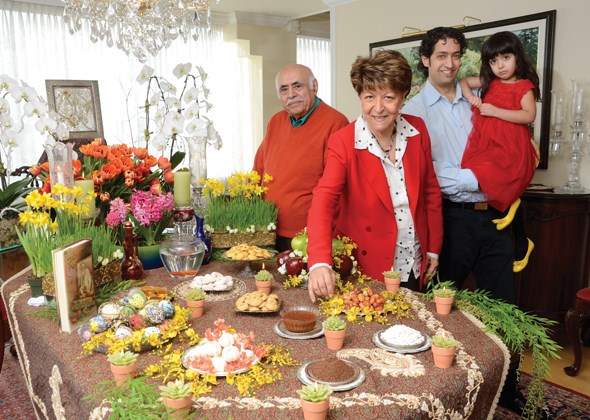With Norouz set to begin this week, Nassreen Filsoof is getting ready to celebrate with family and friends.
The festival celebrates the new year of the Persian calendar, which this year falls on March 20, with festivities set to continue for the following 13 days.
As the founder and current president of the Canadian-Iranian Foundation, and grandmother of six, Filsoof holds a special love for Norouz for its "celebration of family, life and beauty."
A focal point of the 13-day festivities is setting up and maintaining a Haft-Seen table, a table decorated by several symbolic items.
"The significance of the table is extremely important, it has seven items that indicate something, something that is part of life. We have eggs, which are about fertility, sumac which is the spice of life, the green wheat sprouts that we always have, which is about the beauty and rebirth of nature, candles, which show the light of life, fish, which they say brings luck or something I'm not too sure, and vinegar, which is the sign of wisdom, and lastly, garlic which is a disinfectant and puts evil spirits away."
Additionally the table is decorated with fresh flowers, with hyacinth being a particular favourite.
Filsoof, who lives in West Vancouver with her husband, notes that there is a significant difference between the celebrations in Iran and Canada.
"In Iran, (Norouz) is much more extravagant, it's the most important celebration all year. Seventy million people celebrate it over there and you would take 13 days of holiday, but over here, some people take off about one or two days but that is it."
Educated at the Iran University of Medical Sciences, Filsoof left Iran in 1982 ultimately because of the revolution. She eventually moved to Vancouver in 1985 with her family and started her own healthcare service specializing in long-term care. Her passion for seniors health and her love of family and friends are just some of the reasons why Filsoof likes the ancient celebration.
"One of the most important things is you always go and visit seniors first. The elders in the family are the most important people. So always the younger generation go and visit the older people and receive gifts from the elders."
Additionally, it is a time to renew friendships, and it is customary to visit family and friends.
Another custom is the Festival of Fire, where celebrants jump over fires and sing traditional Persian songs. The fire, with an emphasis on light driving out darkness and other symbols, shows the festival's original connection to Zoroastrianism, a Persian religion. Thousands of people attend the local fire jumping at Ambleside Park.
"Every year I jump over the fire, it's something you do every year like Christmas or New Year's; it grows on you as a kid and you expect to do it automatically."
However, while there is a religious and spiritual background to the Persian New Year celebrations, Filsoof says she regards it more as a family tradition, an event tied more so to Persian culture rather than religion.
"(Norouz) is mostly a heritage tradition, it's not a religious festival at all."



